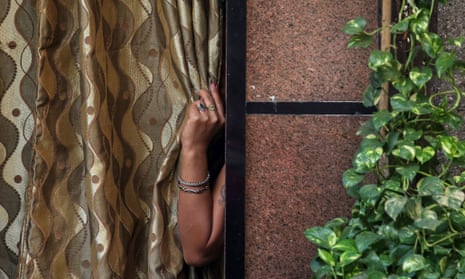Organisations led by sex workers that support sex-worker rights need more funding to eliminate violence against women, halt the spread of HIV and end discrimination on the grounds of gender, according to a report published on Wednesday.
About half of the €8m (£6.3m) earmarked by foundations and NGOs to fund sex-worker rights last year – €4.5m – went to groups that were led by sex workers, said a survey conducted by the Open Society Foundations, Mama Cash and the Red Umbrella Fund, published on the international day to end violence against sex workers.
But the report, Funding for Sex-worker Rights, said this amount is insufficient to bring long-term change. It added that because sex work is criminalised in many countries, which limits government funding options, money from private sources is essential.
“Sex workers are organising around the world for their rights but lack access to funding,” said the report. “Most sex worker-led organisations rely heavily on volunteer work and other in-kind contributions from within their community, while social change can only be achieved through sustained investments and long-term strategies that often require additional external funding.
“Funders should increase their investments in sex-worker rights in general and their grant-making to sex worker-led organisations in particular.”
The report, which surveyed sex-worker organisations and private funders, highlighted the fact that the €8m allocated for sex-worker rights last year was dwarfed by the amount spent on human rights. According to the latest figures from the state of global foundation grant-making, $1.7bn was spent on supporting human rights groups in 2011.
Of the organisations that did invest in sex-worker rights, only 12 invested more than €10,000. Three foundations – the Open Society Foundations, the Ford Foundation and the American Jewish World Service – invested more than €500,000 last year.
Most of the funding goes to organisations in low- and middle-income countries, although only a small amount goes to the region with the largest population – Asia and the Pacific. More than half of the organisations receiving the money were small groups, with budgets of less than €50,000 a year, said the report.
It found that funding from governments and multilateral organisations to sex-worker organisations amounted to about the same as that given by foundations and NGOs, but this was a tiny fraction of the €140bn of total aid spending by governments last year.
“Sex workers are entitled to human rights and protection, just like anyone else. If sex workers are harassed, whether it is from a client, their husband or the police, they should be able to press charges and get support just like any other person,” said Nadia van der Linde, coordinator at the Red Umbrella Fund, a global sex worker-led fund.
“Sex workers are best positioned to explain what the problems are that they are facing, and to come up with solutions. But they need to be able to organise themselves and create opportunities to speak out. For this, sex-worker organisations need funding.”
